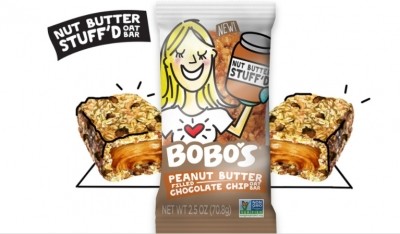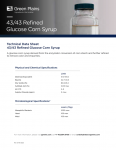Bobo’s raises $5.5m to expand oat bar empire, predicts 40% growth in 2019

“Aside from Kind bars, the nutrition bar category doesn’t taste good,” said TJ McIntyre, who was speaking to FoodNavigator-USA after raising $5.5m in a Series B1 round led by Boulder Food Group (BFG), and supported by Ridgeline Ventures and BIGR Ventures.
“Consumers are enduring products because of their Nutrition Facts statement, absence of sugar, grams of protein and so on,” he argued.
But jumping on nutritional or dietary bandwagons from Paleo and Keto to CBD – which can deliver short-term spurts of growth - is not what helped category gamechangers such as Kind bar strike CPG gold, he observed.
At base, consumers love Bobo’s products because they are simple, wholesome, and satisfying, and truly deliver on taste, he claimed.
“Our products stand the test of time.” Put another way, he said, “My grandchildren will be eating Bobo’s. I do not believe that they will be eating RXBARs.”
‘A maniacal focus on margins’
Bobo’s baked oat bars are now in 16,000+ stores across the US, with sales growing 70% in 2017, 45% in 2018, and an anticipated 40% in 2019, said McIntyre, who headed up the natural brands division at Boulder Brands before joining Bobo’s in January 2016, and brought with him a “maniacal focus on margins [Bobo’s gross margin exceeds 50%].”
He added: “2018 was a fantastic growth year, and a very stressful year, because we came up on our capacity [at its bakery in Boulder] faster than we anticipated.
“This [funding] round funds the expansion of our new bakery in Loveland, Colorado, which opened in January, and will give us the ability to double our capacity. But our continued growth requires some capital as it’s not until 2020 that we anticipate achieving profitability.”
‘My grandchildren will be eating Bobo’s. I do not believe that they will be eating RXBARs’
While making oat bars isn’t rocket science, the Bobo’s brand is defensible, he observed.
“If someone were to compete with us, they would have to go out and hire 100+ people and spend a lot of money on ovens. If they went to a co-packer, the first thing the co-packer would say is, ‘Sure, I’ll make you some oat bars, but I’m not going to make them like that, I’ll cold extrude them and put them through a tunnel oven, and they would taste like a Quaker chewy bar.’
“It’s not about distinct IP. We’re focused on driving incremental growth in the center of the store with a product that’s homemade and handmade and simply delicious.”

‘We need to stay focused’
Asked about new products, he said: “The brand has the ability to go beyond oats to anything that’s homemade and delicious, and I think the cereal bar category gives us the latitude to go into other breakfast occasions. We could do granola, we could get into oatmeal, we could make cookies pretty easily.
“But we’re not planning to enter a wide array of categories where we’re hitting singles and doubles, but instead go really deep in a couple of categories.”

$30m run rate
Tempting though it is to take your brand in multiple directions when it’s doing well, he said, “We need to stay focused, and stay in our lane.”
To put things into perspective, Bobo’s has a run rate of just over $30m and is competing with brands such as Clif Bar, Kind and LÄRABAR, which are generating revenues in the hundreds of millions of dollars, he added.
“With private equity partners on board, they are going to have to achieve some liquidity, and if we’re going to maximize that outcome, we realize that a strategic [ie. a potential acquirer down the line] is going to need to see something that they can deeply sink their teeth into, a brand that is going to be multi-generational, that can achieve a top three brand position in nutrition or cereal bars, so we are taking a very long term view.”
Conversations with Walmart
Bobo’s has built deep partnerships with leading natural channel retailers such as Whole Foods, and conventional channel players such as H.E.B., Wegmans, Albertsons, Safeway, and Kroger, said McIntyre, who said the brand was getting more exposure and shelf space every quarter.
Asked about Walmart, he said: “Walmart has come to us three times and we haven’t walked through that door yet because we want to make sure we do it right.
“We’re in conversations with them right now about a test that they have coming up, as we think it’s time to take a tepid first step. But if we go in there and pick up distribution that doesn’t work, and we have to come out, resurrection is the hardest part of this business, and to date, Bobo’s has not picked up any distribution that we have not held, so we approach those enormous opportunities cautiously.”

‘Dot Foods has become a really important partner’
Asked about opportunities for Bobo’s – which pairs well with coffee – in cafes and coffee shops, he said: “We sell to a lot of up and down the street distributors and [foodservice redistribution service] Dot Foods has become a really important partner for us; we’re distributed through over 100 distributors through Dot Foods right now.
“We’re also making significant investments in eatbobos.com and Amazon. Our growth rate with eatbobos.com is 150% this year and I think we’ll grow at a rate around that for the next couple of years.”
Boulder Food Group (BFG) founder and managing partner Tom Spier, who is joining Bobo’s board, said BFG had been following Bobo’s progress for years (the brand was founded in 2003 by Beryl Stafford and funded with debt financing until it took on its first outside funding via an $8m series A round in early 2017. It raised a further $3.5m in late 2018).
“We’ve always liked the brand so when the opportunity presented itself to partner with TJ and Beryl and the existing partners, it was a pretty fast yes for us,” added Spier, who cofounded frozen entrée brand EVOL Foods and was COO at Bear Naked.



















